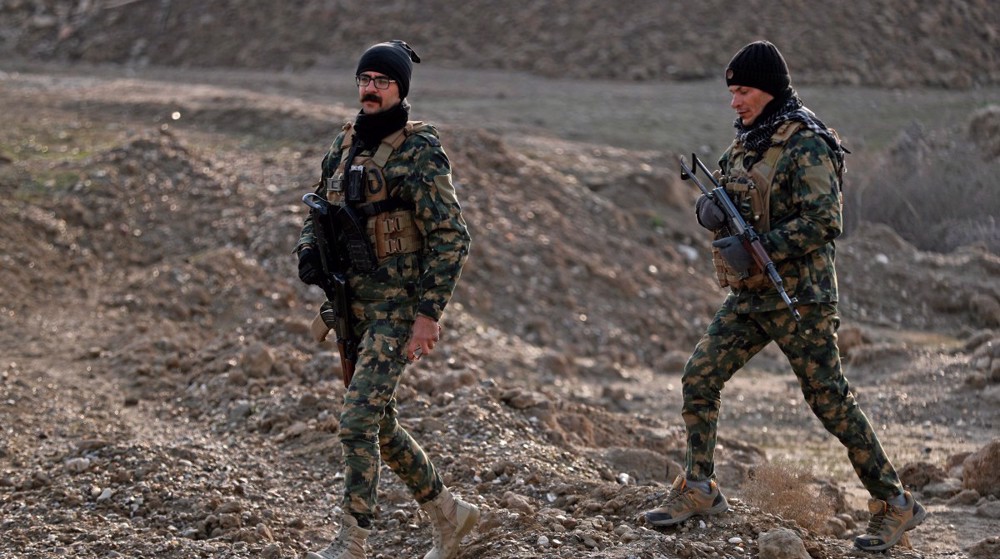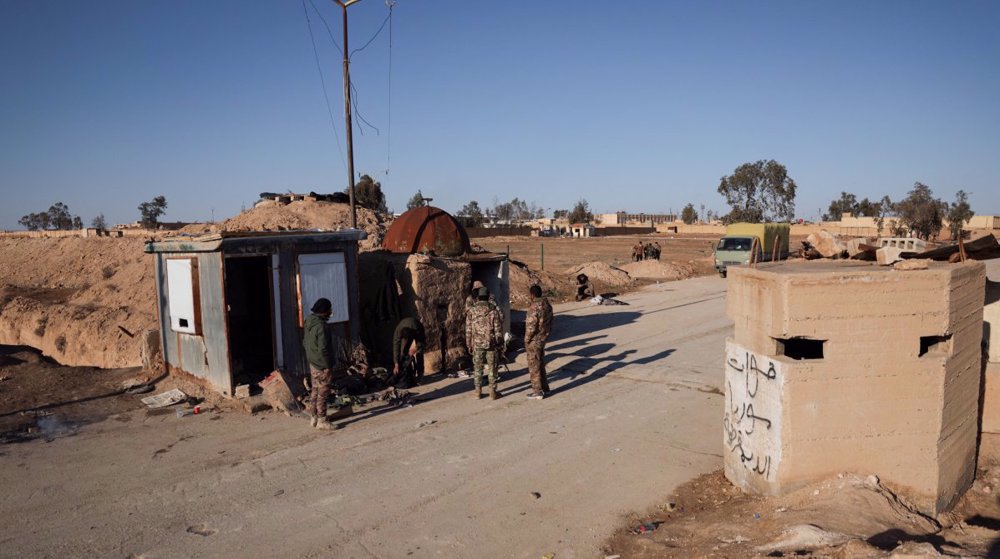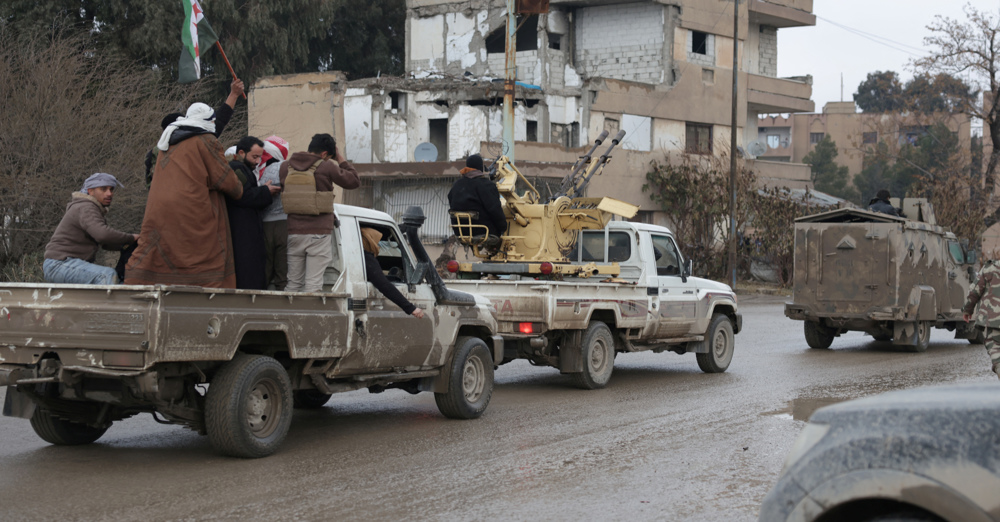Yesterday foes change course as Syria thrashes militancy
As the Syrian army clears swathes of the country from the control of foreign-backed terrorists, there are signs on the horizon that some countries who were previously lending support to those terrorists have come to grips with reality that the Syrian government is going to be there for the foreseeable future and are accordingly changing course from hostility to recognizing the sovereignty of Damascus.
In the latest development, the Foreign Minister of Bahrain Sheikh Khalid bin Ahmed bin Mohammed Al-Khalifa has been seen in a friendly encounter with his Syrian counterpart, Walid al-Muallem, at headquarters of the United Nations on the sidelines of the 73rd annual meeting of the UN General Assembly in New York.
The video shows the rare encounter between the two ministers, who hugged each other, shook hands and exchanged a few works as other officials from both countries were watching the scene.
The encounter was the first of its kind since the Syrian crisis erupted in 2011.
The development is notable as Bahrain was one of those countries who voted to freeze Syria’s membership at the Arab League in Cairo after which, many Arab countries also recalled their ambassadors from Damascus.
Another factor that makes the encounter one-of-a-kind is that Bahrain, which has been also faced with an uprising by the country’s Shia majority since 2011, owes its survival to Saudi Arabia’s help, which send forces to the tiny Persian Gulf monarchy to suppress Bahraini protesters. As a result, Manama has so far served as a Saudi stooge to promote Riyadh’s political agenda on various fronds, including by funding and abetting terrorist operations against the legitimate government of Syria.
It is no secret that Saudi Arabia has spared neither effort nor money in helping foreign-backed militancy in the war-ravaged Syria and Bahrain, as one of its close allies, has been a tool in its grand plan to topple the Syrian government.
Virtually all of the Persian Gulf Cooperation Council states supported various militant groups in Syrian over the past years. In recent years, however, this unity has diminished and states’ priorities have changed. Those countries that have invested the most in the Syrian conflict, namely Saudi Arabia and Qatar, have fallen apart. The current splits between Riyadh and Doha seem durable.
Other countries, including Bahrain, Kuwait, and the United Arab Emirates (UAE), have toned down their rhetoric and reduced their support for militants.
Unlike Saudi Arabia and some of its allies, Egypt has also repeatedly expressed support for Syria's unity and the government of President Bashar al-Assad.
Egypt condemned an April 14 missile attack by the US, Britain and France against sites and research facilities near Damascus and Homs.
Egyptian Foreign Minister Sameh Shoukry has said Cairo and Riyadh did not share common views on the Syria crisis while Egyptian President Abdul-Fattah el-Sisi stressed that he supported the Syrian army in its war against terrorists.
Egypt sent a large delegation to the Damascus International Fair held on August 17-26, 2017.
Egyptian Charge d'Affaires in Damascus Muhammad Tharwat and the delegation members stressed their support for the Syrian people and for the Syrian government, and their desire for closer economic relations and Egyptian participation in the rehabilitation of Syria.
In an interview with the Syrian government Al-Watan daily, Tharwat said, "Egypt's participation in this year's Damascus International Fair is natural given the character of the commercial relations between the two countries. We hope that this participation will play a part in restoring the economic relations between the two countries, and that we will play a part in the re-building [of Syria]."
Tharwat stated that, throughout the Syria crisis, Egypt maintained its neutrality and "the Egyptian Embassy continued to operate and did not close following the decision of the Arab League, at the start of the crisis, to recall the ambassadors [from Syria]... [True,] we decided to downgrade relations to the level of charge d'affaires, [but] we are not the only country that did that."
Also in November 2016, Egypt reportedly sent 18 helicopter pilots to Syria to support the war-torn Arab nation in its fight against terrorism. Cairo’s decision to play a role on the battlefield against terrorists, including the Takfiri Daesh militant group, in Syria came at a time when Egypt is also battling the Takfiri outfit’s branch at home.
Militants have been leading a deadly campaign of violence against both Egyptian security forces and civilians in Cairo and the restive Sinai Peninsula.
Meanwhile, Jordan has also said only a political solution would guarantee the stability and the territorial integrity of Syria.
"Continued violence will only lead to more violence, conflict, fighting and displacement whose victim is the Syrian people," Jordanian government spokesman, Mohammad al-Momani, who is also minister of state for media affairs and communications, said in a statement on April 14 carried by state-news agency Petra.
In a surprising change of tone, Israeli minister for military affairs Avigdor Lieberman, who has a long history of hurling threats of doom and destruction against Syria and President al-Assad, last week expressed readiness to reopen the Quneitra border crossing with Syria in the Golan Heights.
“We are ready to open the crossing as it was before, and now the ball is in the Syrian court,” Lieberman told reporters as he toured the area on Thursday.
Lieberman added that Israel never wanted conflict with Syria and was ready to ensure a 1974 armistice agreement between the two sides is strictly observed.
The Golan Heights is a Syrian territory, which Tel Aviv has been occupying since 1967 and claims as its own territory despite international criticism.
In August, the United Nations Disengagement Observer Force (UNDOF) returned to the border between Syria and the occupied territories, four years after it was shuttered due to militant attacks.
Lieberman’s comments come against the backdrop of Syria’s major victories against terrorists, drawing an outlook for the country that is far more different than what Tel Aviv and its allies had hoped for over the past years.
The apparent call for de-escalation could also be a product of strained relations with Russia.
Ties between Israel and Russia spiraled down to historic lows last week, after Israeli fighter jets pounding Syrian government targets misled the Syrian air defenses into shooting down a Russian surveillance plane by using it as a shield.
While the US and certain governments in the region have been cited as supporters of Daesh and other anti-Assad militant groups, it is common knowledge today that Israel has also had its fair share in helping the terror outfits survive.
Throughout their battles, Syrian army forces have time and again discovered Israeli weapons and equipment in large volumes from terrorist hideouts. Israeli hospitals have also taken in some of the militants injured in Golan areas.
The Israeli air force has carried out regular airstrikes against the Syrian army and government targets across the country, a trend that Israeli Prime Minister Benjamin Netanyahu claims are aimed at pushing Iranian military advisers helping Damascus in its anti-terror fight out of the country.
Moshe Ya’alon, Lieberman’s predecessor, admitted last year that Tel Aviv had formed a tacit alliance with Daesh, saying the group had "immediately apologized" to Tel Aviv after firing "once" into Israel.
French President Emmanuel Macron in June said his country no longer deems the removal of al-Assad as a precondition for resolving the conflict in the Arab country.
"The new perspective that I have had on this subject is that I have not stated that Bashar al-Assad's departure is a precondition for everything because nobody has shown me a legitimate successor," said Macron on June 21 in an interview published in several European newspapers.
While noting that global cooperation is required to solve the crisis in Syria, Macron stressed that Russia's cooperation is “especially needed” to eradicate Daesh.
US Ambassador to United Nations Nikki Haley said in March last year that the United States' diplomatic policy on Syria for now is no longer focused on making al-Assad, leave power.
Syria has been gripped by unrest since 2011, when militancy first began in the country. Foreign states opposed to President Assad have since then been funding and providing weapons to anti-Assad militants, among them thousands of paid foreign terrorists dispatched to help force Assad out of power.
The Syrian government, however, has been fighting that militancy back, aided in that battle by advisory military support from Iran and Russia. Moscow has also been conducting an aerial campaign against terrorist positions in the Arab country on a request by Damascus.
Syria has been struggling with foreign-backed militancy since 2011 in a battle that has left large parts of the country in ruins, destroyed most of its infrastructure and killed hundreds of thousands of people.
All in all, the sudden about-face more than anything else shows how the Syrian government, with the help of its allies, has been able to turn the tide against the foreign-backed militancy.
FM Araghchi departs Muscat for Doha following nuclear talks with US
Israeli keeps killing more Palestinian civilians in Gaza amid relentless ceasefire violations
Aliyev: Azerbaijani territory will not be used for threats against Iran
Turkey arrests two on charges of spying for Israeli regime
Iran FM declares ‘good start’ as US–Iran talks conclude in Muscat
Iran strongly condemns 'terrorist' mosque blast in Islamabad
Iran enters talks backed by national power, popular support: MP
France, UK involved in assassination of Muammar Gaddafi's son: Reports













 This makes it easy to access the Press TV website
This makes it easy to access the Press TV website